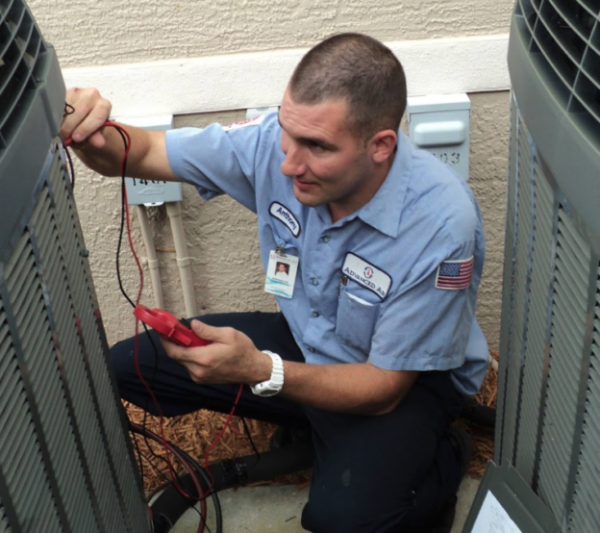Why Is My AC Leaking Refrigerant?
January 03, 2025

In Florida, the last thing you want is for your air conditioner to stop cooling. Unfortunately, this can happen if your system has a refrigerant leak. While component damage causes large leaks, your AC can also develop small leaks from accumulated wear and tear, leading to gradual performance loss.
Understanding what causes leaks and how to detect them helps ensure your HVAC system continues to operate efficiently. In this guide, we'll discuss:
- Common causes of AC refrigerant leaks
- The impact of improper AC installation on refrigerant leaks
- How HVAC companies use advanced leak detection technologies
- Preventive maintenance tips to avoid AC refrigerant leaks
- How to handle refrigerant leaks safely and legally
Our guide will equip you with the knowledge to identify, prevent, and repair AC refrigerant leaks.
Stop the Leak: Schedule Your Repair with Advanced Air Today!
Is your air conditioner not cooling properly? Schedule an AC repair through Advanced Air. Fast and convenient scheduling, alongside our decades of expertise, allows us to get most systems back up and running within 24 hours.
Common Causes of AC Refrigerant Leaks
AC refrigerant leaks can occur for many reasons. The most common causes include:
- Wear and tear: Over time, normal vibrations and changes in temperature and pressure can weaken seals and joints throughout an AC system, leading to refrigerant leaks. One benefit of regular HVAC maintenance is the ability to monitor your system and identify any signs of wear and tear early on.
- Corrosion: Many AC systems develop moisture buildup from temperature changes, potentially causing corrosion. This affects the integrity of your air conditioner's coils and refrigerant pipelines.
- Age: Older AC systems are more susceptible to failure and leaks.
- Loose fittings: Various fittings and joints in your HVAC system can loosen over time. Checking these fittings during maintenance helps prevent leaks.
- Broken seals and gaskets: Sometimes, seals and gaskets fail, allowing refrigerant to escape.
- Environmental factors: Florida's climate places great strain on air conditioners. Besides affecting how long your AC will last, these environmental conditions also increase the risk of refrigerant leaks. Living along the coast carries a higher risk due to salt air exposure.
The Impact of Improper AC Installation on Refrigerant Leaks
Your AC unit may be leaking freon due to age or damage, but installation also plays a role. Poor installation increases the wear and tear on your system by increasing vibrations. Incorrect brazing and soldering can also leave tiny imperfections in your system that eventually widen into holes.
Reputable HVAC companies know how to install delicate components safely, checking for any refrigerant leaks before declaring the installation complete. Always choose a reliable company like Advanced Air for all installations, repairs, and maintenance.
How HVAC Companies Use Advanced Leak Detection Technologies
Common refrigerant leak symptoms include poor cooling performance, longer cycles, and increased energy bills. You may also see oily spots on AC components or notice strange smells near the system.
However, none of these symptoms confirm a leak is present. This is why it's best to contact a professional, as HVAC technicians use advanced methods such as fluorescent and electronic leak detection.
Technicians also have ways to find even the tiniest leaks using ultrasonic or pressure-based detectors. This allows you to catch problems before they worsen.
Preventive Maintenance Tips to Avoid AC Refrigerant Leaks
A few simple maintenance measures can help prevent leaks and reduce the risk of AC breakdowns throughout the summer. Some of the things you can handle yourself include:
- Replacing air filters regularly and keeping the outdoor unit clean to reduce system strain
- Tracking system performance and checking your energy bills for any sudden changes
- Inspecting visible components for oily spots, signs of corrosion, or wear and tear
- Cleaning the drain line, vents, and coils regularly
However, DIY maintenance doesn't replace professional tune-ups. Florida homeowners should schedule these at least once or twice a year to maximize their air conditioner's performance and lifespan.
How to Handle Refrigerant Leaks Safely and Legally
If you suspect a major refrigerant leak, turn off the system and contact a licensed HVAC professional. Licensed technicians know how to fix refrigerant leaks in AC systems while complying with EPA guidelines that dictate how refrigerants can be used or disposed of.
Technicians require EPA certification to work with and purchase refrigerants. However, you can rest assured that Advanced Air technicians hold all relevant qualifications to repair leaks safely and legally.
Trust Advanced Air for Expert Leak Detection and Repair
See why Advanced Air has been in business since 1989 and earned thousands of 5-star reviews. Don't sweat through summer. Schedule your AC repair today!
- Posted in:
- Air Conditioning

